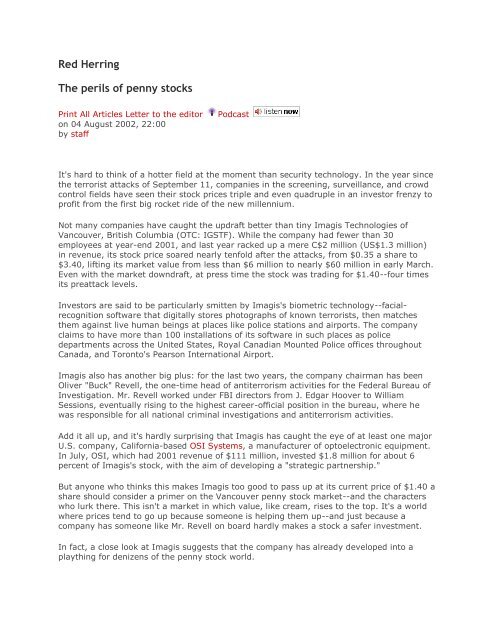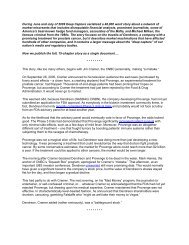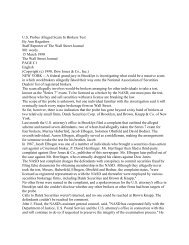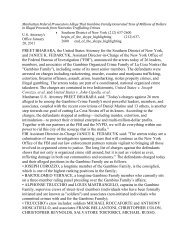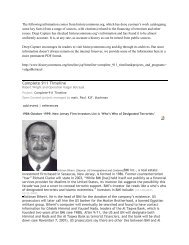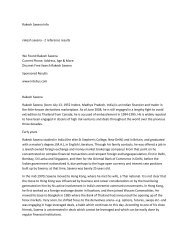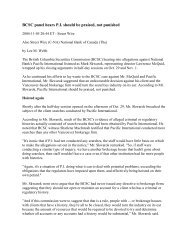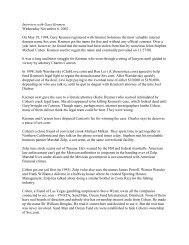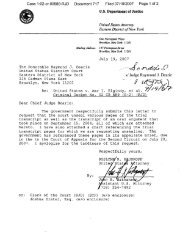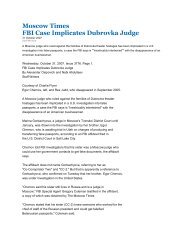Red Herring The perils of penny stocks - Deep Capture
Red Herring The perils of penny stocks - Deep Capture
Red Herring The perils of penny stocks - Deep Capture
You also want an ePaper? Increase the reach of your titles
YUMPU automatically turns print PDFs into web optimized ePapers that Google loves.
<strong>Red</strong> <strong>Herring</strong><br />
<strong>The</strong> <strong>perils</strong> <strong>of</strong> <strong>penny</strong> <strong>stocks</strong><br />
Print All Articles Letter to the editor<br />
on 04 August 2002, 22:00<br />
by staff<br />
Podcast<br />
It's hard to think <strong>of</strong> a hotter field at the moment than security technology. In the year since<br />
the terrorist attacks <strong>of</strong> September 11, companies in the screening, surveillance, and crowd<br />
control fields have seen their stock prices triple and even quadruple in an investor frenzy to<br />
pr<strong>of</strong>it from the first big rocket ride <strong>of</strong> the new millennium.<br />
Not many companies have caught the updraft better than tiny Imagis Technologies <strong>of</strong><br />
Vancouver, British Columbia (OTC: IGSTF). While the company had fewer than 30<br />
employees at year-end 2001, and last year racked up a mere C$2 million (US$1.3 million)<br />
in revenue, its stock price soared nearly tenfold after the attacks, from $0.35 a share to<br />
$3.40, lifting its market value from less than $6 million to nearly $60 million in early March.<br />
Even with the market downdraft, at press time the stock was trading for $1.40--four times<br />
its preattack levels.<br />
Investors are said to be particularly smitten by Imagis's biometric technology--facialrecognition<br />
s<strong>of</strong>tware that digitally stores photographs <strong>of</strong> known terrorists, then matches<br />
them against live human beings at places like police stations and airports. <strong>The</strong> company<br />
claims to have more than 100 installations <strong>of</strong> its s<strong>of</strong>tware in such places as police<br />
departments across the United States, Royal Canadian Mounted Police <strong>of</strong>fices throughout<br />
Canada, and Toronto's Pearson International Airport.<br />
Imagis also has another big plus: for the last two years, the company chairman has been<br />
Oliver "Buck" Revell, the one-time head <strong>of</strong> antiterrorism activities for the Federal Bureau <strong>of</strong><br />
Investigation. Mr. Revell worked under FBI directors from J. Edgar Hoover to William<br />
Sessions, eventually rising to the highest career-<strong>of</strong>ficial position in the bureau, where he<br />
was responsible for all national criminal investigations and antiterrorism activities.<br />
Add it all up, and it's hardly surprising that Imagis has caught the eye <strong>of</strong> at least one major<br />
U.S. company, California-based OSI Systems, a manufacturer <strong>of</strong> optoelectronic equipment.<br />
In July, OSI, which had 2001 revenue <strong>of</strong> $111 million, invested $1.8 million for about 6<br />
percent <strong>of</strong> Imagis's stock, with the aim <strong>of</strong> developing a "strategic partnership."<br />
But anyone who thinks this makes Imagis too good to pass up at its current price <strong>of</strong> $1.40 a<br />
share should consider a primer on the Vancouver <strong>penny</strong> stock market--and the characters<br />
who lurk there. This isn't a market in which value, like cream, rises to the top. It's a world<br />
where prices tend to go up because someone is helping them up--and just because a<br />
company has someone like Mr. Revell on board hardly makes a stock a safer investment.<br />
In fact, a close look at Imagis suggests that the company has already developed into a<br />
plaything for denizens <strong>of</strong> the <strong>penny</strong> stock world.
At the center <strong>of</strong> some <strong>of</strong> the recent action is a mysterious Boston financier named Treyton<br />
Thomas, who issued a carefully worded quasi-buyout <strong>of</strong>fer in the spring that caused a<br />
sudden rise in Imagis's stock price. We'll delve more deeply into the story <strong>of</strong> Mr. Thomas in<br />
a minute, but for now it's enough to know that he claims to run a hedge fund that may or<br />
may not exist, and that he operates out <strong>of</strong> a building in Boston where you can rent a desk<br />
by the week or even the day. Whether or not these are solid credentials, I can't say, but<br />
Imagis recently gave Mr. Thomas a seat on its board, at the elbow <strong>of</strong> Mr. Revell.<br />
Imagis has a typical background for a Canadian <strong>penny</strong> stock. <strong>The</strong> company was<br />
incorporated in the spring <strong>of</strong> 1998 as a "blind pool" fund, in which speculators paid C$0.30<br />
per share for 1.5 million shares <strong>of</strong> stock, giving the business C$450,000 with which to buy a<br />
company <strong>of</strong> some sort and set itself up in business.<br />
<strong>The</strong>re were five original Imagis shareholders, with one <strong>of</strong> them--a fellow named Altaf<br />
Nazerali--apparently calling the shots. <strong>The</strong> five appear as founding shareholders in a<br />
number <strong>of</strong> similar deals, most <strong>of</strong> which are complex financing transactions that seem to end<br />
in <strong>of</strong>fshore shell company accounts.<br />
In any case, no sooner did Mr. Nazerali have Imagis up and running the following spring<br />
than he invited Mr. Revell, by that time five years into his retirement from the bureau, to<br />
join the company as an outside director. Mr. Revell says he had Mr. Nazerali "vetted" before<br />
accepting the <strong>of</strong>fer, and that Mr. Nazerali has "never been involved in unethical or illegal<br />
activity."<br />
Within a year, Mr. Nazerali had elevated Mr. Revell to the position <strong>of</strong> chairman, even as new<br />
players began to gather in the hope <strong>of</strong> some action. By year-end 2000, the company had<br />
issued more than 985,000 options to insiders, and 200,000 warrants to outside promoters<br />
in exchange for their stock-touting services.<br />
But that was nothing compared with what lay ahead. As 2001 unfolded, Imagis began<br />
pumping out an absolute avalanche <strong>of</strong> options, warrants, and unregistered stock. By the<br />
end <strong>of</strong> the year, 6 million shares <strong>of</strong> such unregistered paper were in the hands <strong>of</strong> more than<br />
50 unnamed investors. Mr. Revell received options for 100,000 shares.<br />
At that point, the mysterious Mr. Thomas made his appearance. He claims to be the owner<br />
and principal <strong>of</strong> a $600 million <strong>of</strong>fshore hedge fund outfit called the Pembridge Group, and<br />
to head a philanthropic foundation bearing his name. So he seemed to be perfumed with the<br />
aroma <strong>of</strong> money when Imagis's CEO, Iain Drummond, and Mr. Revell met him. Both say<br />
they "checked him out."<br />
Yet they never asked for or saw an audited (or unaudited) statement <strong>of</strong> his fund's holdings<br />
or performance. <strong>The</strong>y never spoke to a single investor in any <strong>of</strong> the funds. <strong>The</strong>y never<br />
asked for his employment history, a D&B report on his group, or even information on his<br />
alleged foundation. <strong>The</strong>y never even visited his <strong>of</strong>fice.<br />
Securities industry regulatory filings show that Mr. Thomas enlisted in the U.S. Marine Corps<br />
in 1974 at the age <strong>of</strong> 18 and served as a courier in Rabat, Morocco. Following his discharge<br />
in 1977, he attended Virginia Polytechnic Institute.<br />
But gaining career traction wasn't easy for the young man, and after leaving college in 1981<br />
he moved through six jobs before landing a steady position as a broker in the Atlanta <strong>of</strong>fice
<strong>of</strong> Merrill Lynch in 1984. He left in 1989, and thereafter worked through six more jobs,<br />
including a stint as a private investor with an otherwise unknown Atlanta outfit named<br />
Pembroke Holdings, before leaving the securities industry entirely in 1998.<br />
Little else is known, except that in 1997 Mr. Thomas apparently ran afoul <strong>of</strong> the Internal<br />
Revenue Service and was a debtor with at least one tax lien against him. Mr. Thomas<br />
maintains that the taxes were paid and the lien was removed.<br />
Mr. Thomas has claimed in a celebratory press release about himself to have launched the<br />
Pembridge Group in 1995. But business records at D&B give the date as 1997, and list the<br />
organization as a limited liability company located in an Atlanta <strong>of</strong>fice that provides desk<br />
space and telephone service on a short-term basis.<br />
As for Mr. Thomas's Boston <strong>of</strong>fice--well, Mr. Revell and Mr. Drummond only met him,<br />
separately, in their hotel rooms at the Ritz-Carlton in Boston. So they never learned that<br />
Pembridge's "<strong>of</strong>fices" were, once again, nothing but a few desks and a phone answering<br />
service at a company that rents floor space to traveling businesspeople--the same company,<br />
in fact, that operates out <strong>of</strong> the <strong>of</strong>fices where Mr. Thomas was renting space in Atlanta.<br />
Nonetheless, Mr. Revell and Mr. Drummond peeled <strong>of</strong>f another 50,000 warrants at C$2.20<br />
per share to corral Mr. Thomas's "strategic financial advice."<br />
How did Mr. Thomas respond? Scarcely two months after getting his warrants, he issued a<br />
press release implying that the Pembridge Group was interested in taking Imagis private at<br />
an almost 100 percent markup over the existing market price. This caused the stock to<br />
spike immediately, and the value <strong>of</strong> his warrants spurted as well.<br />
Mr. Thomas did not respond to several requests for an interview on these and related<br />
matters. Nor did he respond to a detailed list <strong>of</strong> questions that he requested be submitted in<br />
writing prior to an interview.<br />
Yet Mr. Revell and Mr. Drummond are clearly happy with him. "He's bought up 10 percent <strong>of</strong><br />
our stock," Mr. Drummond told me proudly, while acknowledging that he didn't actually<br />
know for sure whether Mr. Thomas was in fact the owner <strong>of</strong> the shares. Even so, Imagis<br />
<strong>of</strong>fered Mr. Thomas a seat on its board in July, which he accepted.<br />
As for Imagis's actual business--forget it. Whatever the presumed merits <strong>of</strong> its s<strong>of</strong>tware, the<br />
company's auditors flagged its financials with a "going concern" warning in March, and little<br />
has happened since to improve the outlook. Cash and short-term assets have tumbled<br />
dramatically since the start <strong>of</strong> the year, and though revenue is up on new s<strong>of</strong>tware sales,<br />
losses continue to mount.<br />
Is this any way to run a company? On the Vancouver <strong>penny</strong> stock market, it clearly is,<br />
which is something the folks at OSI Systems, having already paid their $1.8 million, may<br />
learn for themselves. As for everyone else, save yourself the cost <strong>of</strong> the lesson and<br />
remember: <strong>penny</strong> <strong>stocks</strong> don't become attractive investments just because the board has a<br />
graybeard chairman with impressive credentials. And if sitting next to him is a man who<br />
claims to run a $600 million hedge fund that may or may not even exist, then just smile<br />
politely and start backing out <strong>of</strong> the room.
Christopher Byron is a syndicated radio commentator and writer living in Connecticut. He is<br />
also the author <strong>of</strong> Martha Inc.: <strong>The</strong> Incredible Story <strong>of</strong> Martha Stewart Living Omnimedia.<br />
Mr. Byron does not invest in equity securities in any form. He holds only U.S. government<br />
bonds, notes, and CDs.<br />
Topics: Stocks, Perils, Penny


